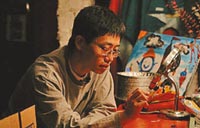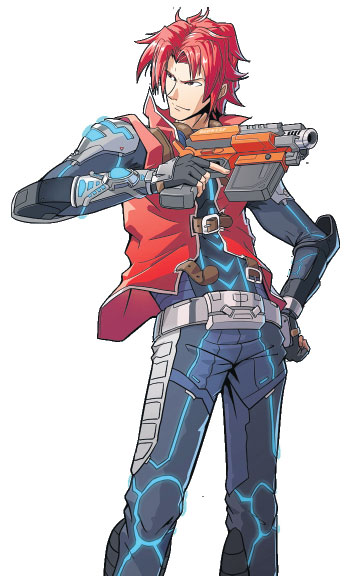In the game
|
An example of one of the characters in Onipunks' C-Wars. |
 |
| Violinist to ski at Sochi |
 |
| Standing up for laughs |
With the game direction set, the KickStarter was launched in April of 2013. The team set a funding goal of $30,000 just to finish the game, and stretch goals to add features to the game if the stretch goals were met.
The relatively unknown team from China, with a demonstrated concept and retro-style art, brought in more than $95,000, enough money to put their games onto consoles.
Video game consoles had been banned for legitimate sales in the country since 2000, until a recent suspension of the ban earlier this month. Despite the ban, Zhou and Mu were still avid gamers. Zhou says his first fond console experience was on the original Sony PlayStation, whereas Mu points to the Nintendo GameCube, which he purchased with his own money. "The thing was perfect," he says. "It had Nintendo games (such as Mario, Zelda and StarFox) and a little handle to take it around."
With the KickStarter success, the duo had a golden opportunity: to create a game for Nintendo and Sony. While they were effectively only "porting", or making their game playable on a console, they were still able to attain licenses to develop for consoles.
Developers looking to make games for consoles require special console hardware that they can test and write the games on. This hardware is called a development kit and to normally obtain one, one requires a license.
"When we reached our stretch goals for PlayStation Vita, Nintendo 3DS and Wii U, we were ecstatic!" says Zhou. "Mu was excited because our game would actually show up on a Nintendo system, whereas I was blown away by the fact that we would show up on PlayStation."
Zhou explains that Onipunks chose to use KickStarter because it would attract international attention. In 2013, KickStarter launched many high-profile video-game projects such as the Ouya. Zhou says that a lot of the people who support KickStarters are gamers, developers and media people and that really helped attract money to their kick-off.
The duo credits much of their success to the art style of their game.
"We're lovers of retro games, particularly games that invoke nostalgia," says Zhou. "A lot of people say our game looks like Fire Emblem and Super Robot Wars, and we tell them that they're correct. We want them to see these games, we want them to feel these games, because we want to bring them back to a time when they had fun playing these games of old."























